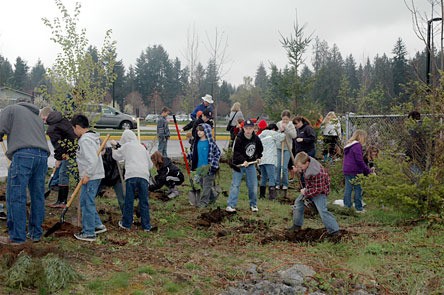TULALIP — Dominique Jenkins and Alexa McClintock spent a rainy school-day morning planting and naming trees.
“We started with ‘T,’ naming them ‘Ted,’ ‘Tessa’ and ‘Tim,'” said Jenkins, as she and McClintock, a fellow fourth-grade student, continued to dig in the soil April 13.
“Now when we come over here, we’ll know which ones are ours,” McClintock said.
“Oh, hello Ted!” Jenkins laughed. “Hey, Tessa! Hi, Tim!”
Jenkins and McClintock were two of the approximately 225 students from the Cooperative Education Program at Quil Ceda Elementary who planted an estimated 2,000 native fir and cedar seedlings near the Marysville Arts and Technology High School in partnership with the Marysville-based Project SeaWolf Coastal Protection.
“Even with the rain, these kids were completely into the hands-on aspect of it,” said Michael Kundu, founder and director of Project SeaWolf. “It’s our biggest turnout yet.”
Kundu explained that the fourth- and fifth-grade students planted native seedlings around the recently constructed Quil Ceda options campus “green-belt,” to help create a natural buffer zone around the site and mitigate the carbon dioxide produced by buildings on campus. He added that, as participating students have learned more over the years about how to plant trees properly, their seedlings’ survival rates have increased from as low as 25 percent to as high as 90 percent.
Kundu thanked the Marysville Rotary Club for its $1,000 grant, as well as the Coastal Keys Realty Group and the Snohomish Group of the Sierra Club for their support of Project SeaWolf’s annual student planting of more than 8,000 native trees since 2002. He noted that the planting projects enhance local ecosystems, provide wildlife habitat and offset carbon dioxide production in the Snohomish County area.
“It’s inspiring to see the students working together to help the Earth,” said Jerri Novy, a fourth-grade teacher at the Co-op at Quil Ceda Elementary. “I like that the planting site is this close to their classrooms, so they can check on their trees and see how successful their hard work is. They like digging in the dirt, and being active and physical, rather than just learning these lessons through talking.”



